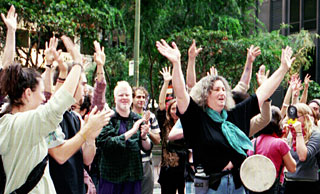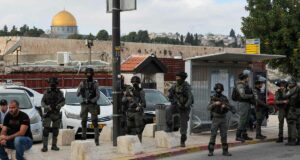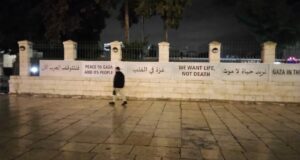What stays with me most from the last few days is the kindness of women. Just ordinary women, caught in bad circumstances, being nice to one another.

I’ve spent a lot of the last week being searched, questioned, detained, jailed, and ultimately denied entry and deported from the State of Israel–that land which I had been raised to believe would always be the ultimate refuge for anyone born Jewish. But not, apparently, for me.
I was refused entrance because of work I have done in the past with the International Solidarity Movement, a group which supports nonviolent resistance against the Occupation. ISM works in the West Bank and Gaza, bringing internationals as witnesses, moral and practical support for nonviolent Palestinian initiatives–like the ongoing campaign against the Wall which the Israeli military is building to protect the illegal settlements which have encroached deeply into the territory once designated for a Palestinian state.
I came to join the ISM out of a deep belief that nonviolence is a powerful means of struggle, that the Jews of Israel who after all are my own people are good people and a nonviolent struggle would touch their hearts and turn the tide toward real justice. I saw efforts to establish a nonviolent movement as a small ray of hope in an endless cycle of killing begetting more killing and revenge begetting revenge.
Four years ago, I spent a month or more working with the ISM. When I left the country, I was questioned and warned that I might have difficulty returning.
But I chose to try, anyway. This time my intention was to work with ecological groups, doing permaculture presentations and trainings. I had invitations from three green Isrtaeli organizations, and the assurance of a lawyer that that would be enough to get me in.
The lawyer was wrong.
There’s a jail that they take people to, who are refused entry into a country or being deported for one reason or another. It’s not a horrific place–no one was being beaten or tortured, no screams echoed on the concrete walls. Those places exist, too, and most Palestinian men and many women have spent time in them, under conditions so much worse than anything I have ever experienced that the strength it takes to survive is hard to fathom.
But this jail is just a kind of limbo, a place to wait, for a forced flight back home, or for a few lucky or intrepid ones with lawyers, for a hearing and a trial. Most people are there for a few hours, maybe a day or two. Some are there longer, as their court cases drag on.
There’s a human tide of immigration that washes around the world, lured by the gravitational pull of jobs and hope. Now and then, the waves crash up against the seawall of a border and leave behind a human being as the sea leaves mementoes of driftwood and shells..
Now I had become a piece of that detritus. And for the other women with me, some tide of hope has also gone out. The first night, I am with Tina, the young American law student of Palestinian descent. She and her brother are plucked from a student tour group and refused entry. All the indignant protests of their law professor, travelling with them, and their professional friends cannot change their fate. Tina, in her headscarf and white poncho, has spent months planning and organizing the trip, and she sobs in disapppointment when it finally becomes clear she will not be able to stay.
With us is Zmerna, who I begin to call the Bewildered Brazilian. She is slim, dark-haired, dressed in her good jewelry and high heels. She speaks nothing but Portuguese, and no one else speaks her language–not the guards, not the Security or the Ministry of Interior or anyone she has contact with through the whole process. A couple of us speak Spanish and at times manage to communicate some simple concepts.
“Prison?” Zmerna says in alarm as the guards marched us into the locked entryway. Tina and her brother have been told they were going to a hotel, where they would have wifi and access to their luggage and computers..
“Not prison,” says the guard. But they separate us from Tina’s brother, and lock us into a small room full of bunkbeds. I say, if you’re locked in and can’t get out, you’re in jail. It’s not the worst jail I’ve ever been in. I note its attractions: plastic mattresses, wool blankets, a toilet with a door that actually closed, a shower. Tina has a horror of germs, and has to force herself to use the facilities. I try to comfort and reassure her. She tries to comfort me. We both sit down and try to comfort Zmerna, who is crying on the other bunk.
Tina’s course which she will now miss is, ironically enough, a human rights course. I tell her she deserves an ‘A’.
“Get some sleep,” I said. “You’ll need your rest.” Bur I find it hard to take my own advice. There’s an energetic field that seems to underly Israel, like a nest of high voltage wires that short circuit continuously, buzzing and jangling. It’s hard to hold an uninterrupted conversation, a train of thought. I find myself able to doze lightly, but not able to relax and truly sleep. My mind keeps buzzing and I keep fighting with it, doing my meditations, grounding, trying to draw some help and nurturance from the land itself. But all I can really feel are walls and fences, barriers to any flow.
By morning, Zmerna and Tina are gone. I refuse the first flights that are offered to me, waiting to hear back from the lawyer my friends have hastily arranged to take my case. One of the guards, round and hard as a billiard ball, with a round beer belly and sharp, round eyes, tries to intimidate me, shouting and bringing out a pair of handcuffs to show me. But his heart isn’t really in it, and he soon gives up and admits that they will not physically force me to get on a plane.
Instead they move me to a new room, with Sol, a young Phillipina with an acne-scarred face, six months pregnant, who istrying to resist going back to the Phillipines. With her is Marie, from Moldava on the border of Romania and Ukraine, who has been here for a month, while her lawyer push her case slowly through the courts. Sol is heavy bodied and tired and sad; Marie is slim, blond, and radiantly cheerful, washing out her underware in the sink, stalking about the cell in her gold, high heeled sandals, creaming her face and chattering on the cell phones. They are economic refugees. In Israel, one of the results of the Intifada and the closures is that the low-level jobs once done by Palestinians are now taken by a stream of immigrants from Russia and Central Europe, Africa and Asia. They come, as immigrants all over the world come, with the hope of bettering themselves, making money to send home, finding love and fortune. When they overstay their welcome, or when the system decides, for its own reasons, not to admit them, they end up here.
Marie gives Sol most of her lunch. I try to give her mine. For some reason, I just can’t eat. It’s not my usual reaction to stress–usually, the worse things get the more I’ll eat anything in front of me. But for once in my life, I have entirely lost my apetite, even though I tell myself that I should eat something. “Eat when you can, sleep when you can, and whenever you get a chance to pee, pee!” is my usual rule. But this time I just can’t force down the mystery meat, the plentiful but greasy and dead-looking chicken wings, potatoes and rice. I do eat some aged salad, and an orange.
To cheer Sol up, I offer to read her cards,, as I have my pocket Tarot deck with me. Her face lights up as I predict something good happening for her, soon. Love, celebration, joyfullness–the cars are like a window into all the bright possibilities on the other side of the walls.
Marie’s cards show trouble ahead, but I comb through them for every hint of good fortune. Strength is at her crown. “You are a strong woman,” I tell her. In truth I am amazed at her ability to smile, to radiate cherrfulness and grace after a month in this place which, for all it’s amenities, is still driving me crazing with boredom after less than a day.
“Ani ’zkah,” she agrees, smiling and nodding with confidence. “I am strong.”
And then Sol gets called by the guards, to be ready to go. Whatever is happening to her, she seems joyful about it. The cards’ prediction is confirmed, and she leaves us, smiling.
The guards, for reasons of their own, move me to a different cell. I am settling into the solitude when the door opens and they usher in Irina, from Russia–Siberia, to be exact. Irina is plump and middle-aged, like me, and she makes herself at home, taking off her blouse and relaxing in her slip. She wears a gold icon around her neck and gold, spoked earrings and she tells me she is a doctor, a gynecologist who has been in Israel for eight years. She speaks fluent Hebrew but little English, and we communicate in Hebrew words I drag up from my deep memory like archaeological relics. She has a big bagful of food and drink, and she makes me drink a cup of orangina and shares her face cream. Although we are both fifty six years old, I can’t help but notice how much better preserved she appears. Her hair is still brown, her face neatly made up, her mouth a red rosebud and her skin clear of wrinkles. Whereas I have no hairbrush–it disappeared in the original search at the airport, my skin is dry and covered with a fine net of wrinkles, and I am coming to more and more resemble the Hag of the Underworld.
Irina does what I think of as ‘the woman thing’…she flirts with the guards, purses up her little rosebud mouth and lowers her eyes, scolds them from time to time, pleads with them. I can’t do it. It’s not that I don’t know how, I just can’t bring myself to do it even though I know that the way I am with them–clear, calm and stubborn–makes them angry.
Irina comforts me as I get bad news from my lawyer, news which convinces me that I have little chance of winning a case. My own cards look consistently dismal.
Irina goes off to Moscow. I try again to sleep. In the night I am jolted awake with the conviction that I have made a terrible mistake in abandoning my case. But in the morning, when I might still get word to my lawyer to carry on with it, the cards say over and over again that it is useless, and time to make a strategic retreat. I can’t ever know, really, if they’re right or wrong, if I’ve lost all objectivity, if my own inner sense of agreement with their verdict is accurate or influenced by the stress of going cold turkey from all my usual addictions and comforts: food, tea, exercise, and above all, work. In the end, I have to make some decision, so I decide to go.
The morning brings two sweet, doll-like Filipina women, sisters who have come, they say, to spend Holy Week with a friend. Immigration has not believed them, and after yelling and shouting and threatening, is sending them back. They are slim and delicate and beautiful, and one speaks English quite well. She is studying for a Bachelor of Science in Tourism, she tells me, and says, again and again, repeating it like a mantra: “You come to the Phillipines, you will not need visa.” They huddle on the bunk in a state of shock, two delicate, frightened birds, while I urge them to eat, to rest, and assure them that they don’t need to be afraid, that nothing terrible will happen to them. Finally I read their cards, too. I feel like I have become the Hag of the Underworld. I’m glad to see their faces brighten a bit, imagining they can go home now with at least a good story and a bit of confidence in a brighter future predicted for them by the old Witch in the bowls of the Israeli jails.
Just as I finish the second sister’s reading, the guards come to escort me to the plane.
I’m in the back of the van with the tall, good-looking guard whom Irina told me was the good one, the one with a heart of gold. “I noticed you were doing something with the cards,” he says. “You read them? What are they called?
And while they load my luggage onto the plane, I read his palm.
Israel is a place where faith is either magnified or abandoned, where belief becomes delusion easily, shifts to fanaticism, or burns itself out into cynical ash. From my first visit there with my Hebrew High School student trip when I was fifteen, For me, something in the air or the water or the energy always challenges every system of belief or faith I come in with: from my childhood faith in a personal God that deserted me in the midst of the Hebrew High School youth trip I was on at fifteen, to my belief that nonviolence would easily turn the hearts of the Israelis back toward justice for all people of the land. And my faith in a refuge.
But I continue to believe in this: that in even the terrible places of the world, we find.the small hands of sisterhood, reaching across boundaries and borders and walls, across gaps of culture and language and belief to do acts of kindness for one another. And that in the end, that power is strong enough to break down the walls.
Starhawk
 International Solidarity Movement Nonviolence. Justice. Freedom.
International Solidarity Movement Nonviolence. Justice. Freedom.


